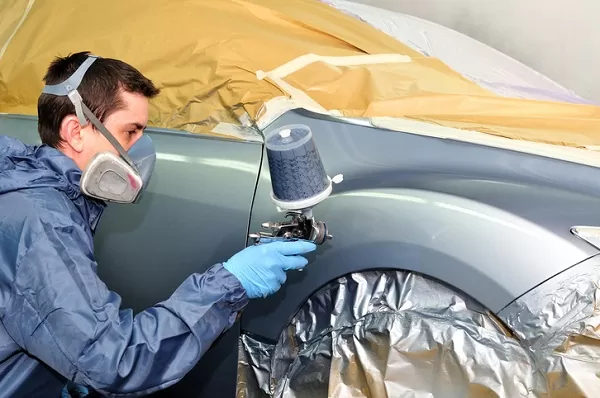Car Panter: The Skill, Craft, and Precision Behind Automotive Painting

When people hear the term car panter, they might assume it’s a misspelling of “car painter,” but in the automotive industry, it often simply refers to the skilled professionals responsible for painting vehicles. A is more than someone who applies color to a car’s surface—they are artists, technicians, and perfectionists rolled into one. Their work goes beyond aesthetics; it’s also about protecting the vehicle’s exterior and ensuring its longevity.
In this article, we’ll explore what a car panter does, the skills required to excel in the profession, the process of painting cars, and why their role is so important in the automotive world.
Who Is a Car Panter?
A car panter is a specialist who prepares and applies paint to vehicles, whether for restoration, repair, or customization purposes. While the title might sound straightforward, the job is highly technical. It requires a deep understanding of different paint types, color-matching techniques, and surface preparation methods.
They work in settings ranging from auto body shops and car dealerships to custom vehicle workshops. In many cases, s collaborate closely with other automotive professionals like panel beaters, dent repair specialists, and detailing experts. This teamwork ensures that a car’s appearance is fully restored or transformed to meet the client’s vision.
The work of a car panter isn’t just about making a car look good—it’s also about providing a protective layer that shields the metal from rust, UV rays, and environmental damage. That’s why high-quality painting is considered both an art and a science.
The Skills Every Great Car Panter Needs

Being a car panter takes more than just a steady hand and a good eye for color. One of the most essential skills is attention to detail. Even the smallest imperfection in the paint can ruin the look of a car, so must work with precision at every stage.
Color matching is another crucial skill. Often, a car panter is tasked with repainting only a section of a vehicle after a repair. They need to ensure that the new paint blends seamlessly with the existing finish—a task that requires both technical knowledge and artistic judgment.
In addition, a good car panter needs technical expertise with tools and equipment such as spray guns, sanders, and polishers. They must also be familiar with safety procedures, since automotive paints and solvents can be hazardous if not handled correctly.
The Car Painting Process
The process of painting a car involves multiple stages, each of which must be executed with care.
First comes surface preparation. This involves cleaning, sanding, and priming the vehicle’s exterior to create a smooth, even base for the paint. Without proper preparation, the paint may not adhere correctly, leading to peeling or uneven coloring later on.
Next is the application of base coats and color layers. This is where the car panter’s skill truly shines. Using spray equipment, they apply thin, even layers, building up the color gradually to achieve the desired finish. Multiple coats may be needed to get full coverage and depth.
Finally, the car is finished with a clear coat. This transparent protective layer enhances the shine, adds durability, and shields the paint from scratches and fading. After curing, the surface may be buffed and polished to achieve a flawless, mirror-like appearance.
Why Car Panters Are Essential in the Automotive Industry
Without car panters, vehicles wouldn’t just look dull—they’d be more vulnerable to damage. Paint acts as a protective barrier against rust, corrosion, and environmental wear. In regions with extreme weather conditions, a high-quality paint job can significantly extend a vehicle’s lifespan.
From a business perspective, the appearance of a car plays a huge role in its resale value. A well-painted, polished car is far more attractive to buyers, which is why dealerships invest heavily in car painting services.
Moreover, custom paint jobs by skilled car panters allow vehicle owners to express their personality and make their cars stand out. Whether it’s a sleek matte black finish or a vibrant custom design, these professionals help bring unique visions to life.
Challenges Car Panters Face
The job of a car panter comes with its share of challenges. One of the biggest is working under time pressure. Clients often want their cars back as soon as possible, but rushing the process can compromise quality. Striking the right balance between speed and precision is a constant challenge.
Environmental factors also play a role. Temperature, humidity, and dust can all affect the quality of a paint job. Car panters need to work in controlled environments and follow strict procedures to prevent imperfections.
Finally, there’s the challenge of keeping up with new technologies. Automotive paints are constantly evolving, with new eco-friendly and water-based options requiring different application techniques. Staying updated is essential to remain competitive in the industry.
Tools and Equipment Used by Car Panters
To deliver high-quality results, car panters rely on a range of specialized tools. Spray guns are perhaps the most important, allowing for precise and even application of paint. High-volume low-pressure (HVLP) spray guns are commonly used to minimize overspray and waste.
They also use sanding tools—both manual sandpaper and powered sanders—to smooth surfaces before painting. Polishing machines come into play at the final stage to give the paint a high-gloss finish.
In addition to tools, protective gear is essential. Respirators, gloves, and coveralls protect car panters from harmful fumes and chemicals. Many also work in spray booths equipped with ventilation systems to ensure a safe working environment.
Becoming a Car Panter: Training and Career Path
While some car panters learn on the job through apprenticeships, many choose to attend vocational schools or training programs. These courses cover everything from paint chemistry and color theory to equipment handling and safety procedures.
Experience is key in this field. The more projects a car panter works on, the better their skill and speed become. Over time, experienced car panters can move into supervisory roles, open their own shops, or specialize in high-end custom paintwork.
The demand for skilled car panters remains strong, thanks to the constant need for vehicle repairs, restorations, and customizations. Those who combine technical skill with an artistic touch often find themselves in high demand.
The Future of Car Painting
The automotive painting industry is evolving, driven by new technologies and environmental concerns. Water-based paints are becoming the standard, reducing harmful emissions compared to traditional solvent-based paints. Automated spray systems are also being introduced in larger facilities, improving efficiency without sacrificing quality.
There’s also a growing interest in special effect finishes, such as pearlescent, chameleon, and matte coatings. These trends are pushing car panters to expand their skills and experiment with new techniques.
Despite technological advances, the human touch remains irreplaceable. Machines may handle large-scale production, but for custom work and detailed restorations, a skilled car panter’s expertise will always be needed.
Final Thoughts
A car panter’s work is a blend of craftsmanship, technical skill, and artistic flair. They don’t just make cars look beautiful—they protect them, enhance their value, and help drivers express their individuality.
From the careful preparation of surfaces to the final glossy polish, every step in the process reflects the dedication and precision of the professional behind the spray gun. In an industry that’s always evolving, car panters who embrace new techniques while mastering traditional skills will continue to thrive.
So, the next time you see a freshly painted car gleaming in the sunlight, remember—it’s not just paint you’re looking at, but the result of hours of expertise and passion from a true car panter.



